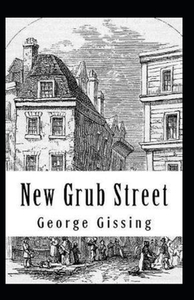You need to sign in or sign up before continuing.
Take a photo of a barcode or cover
I enjoyed this story and its take on the publishing industry in the late nineteenth century. It follows the lives of several authors and shows how their lives improve, or not, as they follow a writing career.
I found it interesting to see how much the attitude and general workings of the industry are still very similar to what they were then. Though I do have a perception that it is much more difficult to get published now than it was then. The technology might have changed but the essence still seems to be the same.
The characters range from the mercenary who only care about the money, those who want the prestige, those that want power, and those who are literally starving but refuse to give up. None of these characters appealed to me, they were, for the most part, sadly pathetic. That said, I liked the story a lot. It was interesting and made me jealous that they could get into the British Museum library, which you can no longer do.
*Note about the Librivox audiobook. This was a collaborative effort with 11 different readers over 46 parts. 15 of these were by Bridget Gaige who was a good reader and easy to listen to. 5 of these were by Jessi who I found difficult to understand due to the monotone delivery and flat articulation of words. 5 were by Alan Brown who was an okay reader but the production value of his parts made it difficult to hear, as it sounded as if he were reading from inside a tin can. 5 were read by hefyd who was pretty good. The remaining 16 parts were read by 7 different people who were relatively decent readers.
The worst elements of this format were the changes in reading speed and loudness between the variety of readers.
I found it interesting to see how much the attitude and general workings of the industry are still very similar to what they were then. Though I do have a perception that it is much more difficult to get published now than it was then. The technology might have changed but the essence still seems to be the same.
The characters range from the mercenary who only care about the money, those who want the prestige, those that want power, and those who are literally starving but refuse to give up. None of these characters appealed to me, they were, for the most part, sadly pathetic. That said, I liked the story a lot. It was interesting and made me jealous that they could get into the British Museum library, which you can no longer do.
*Note about the Librivox audiobook. This was a collaborative effort with 11 different readers over 46 parts. 15 of these were by Bridget Gaige who was a good reader and easy to listen to. 5 of these were by Jessi who I found difficult to understand due to the monotone delivery and flat articulation of words. 5 were by Alan Brown who was an okay reader but the production value of his parts made it difficult to hear, as it sounded as if he were reading from inside a tin can. 5 were read by hefyd who was pretty good. The remaining 16 parts were read by 7 different people who were relatively decent readers.
The worst elements of this format were the changes in reading speed and loudness between the variety of readers.
emotional
funny
informative
sad
tense
medium-paced
Plot or Character Driven:
A mix
Strong character development:
Yes
Loveable characters:
Complicated
Diverse cast of characters:
Yes
Flaws of characters a main focus:
Yes
emotional
reflective
sad
medium-paced
Plot or Character Driven:
Character
Strong character development:
Yes
Loveable characters:
Complicated
Diverse cast of characters:
No
Flaws of characters a main focus:
Yes
This book exemplifies why I love nineteenth-century fiction. It honestly portrays the human spirit without pretension. The grueling writing process and attempt to live on meager wages are brought to life in a vivid portrait of London's writing scene in the 1880's. The characters are realistic, and reading this novel in the present time provides an interesting look at life in Gissing's day.
A really entertaining read about Victorian writers/journalists fighting the rise of mass communication, universal education and popular journalism. I thought the characters were quite interesting; they represented a real, rising issue of the fin-de-siècle but, my gosh, all the characters were so dull or downright horrible. Marian was the real hero of the novel and it sucks that she got treated so awfully by a (in my opinion) FAILED writer. I'm honestly fuming.
I'm eager to read some more of Gissing, though. His writing style is so effortless and I really found myself lost in the story.
This was a good book. I'd recommend.
I'm eager to read some more of Gissing, though. His writing style is so effortless and I really found myself lost in the story.
This was a good book. I'd recommend.
challenging
sad
medium-paced
Plot or Character Driven:
A mix
Strong character development:
Complicated
Loveable characters:
Complicated
Diverse cast of characters:
Complicated
Flaws of characters a main focus:
Yes
challenging
reflective
sad
slow-paced
Plot or Character Driven:
Character
Strong character development:
Yes
Loveable characters:
No
Diverse cast of characters:
Complicated
Flaws of characters a main focus:
Yes
Minor: Child death, Death, Suicidal thoughts, Death of parent, Fire/Fire injury
challenging
dark
emotional
sad
medium-paced
Plot or Character Driven:
Character
Strong character development:
Yes
Loveable characters:
Yes
Diverse cast of characters:
N/A
Flaws of characters a main focus:
Yes
I was hooked on this book and spent every spare minute reading it, and yet I found it quite depressing. As a Victorian realist novel it's clearly meant to reflect real life. A different generation of reader, I find myself hoping for some kind of justice or romanticism in the story, which of course there isn't.





